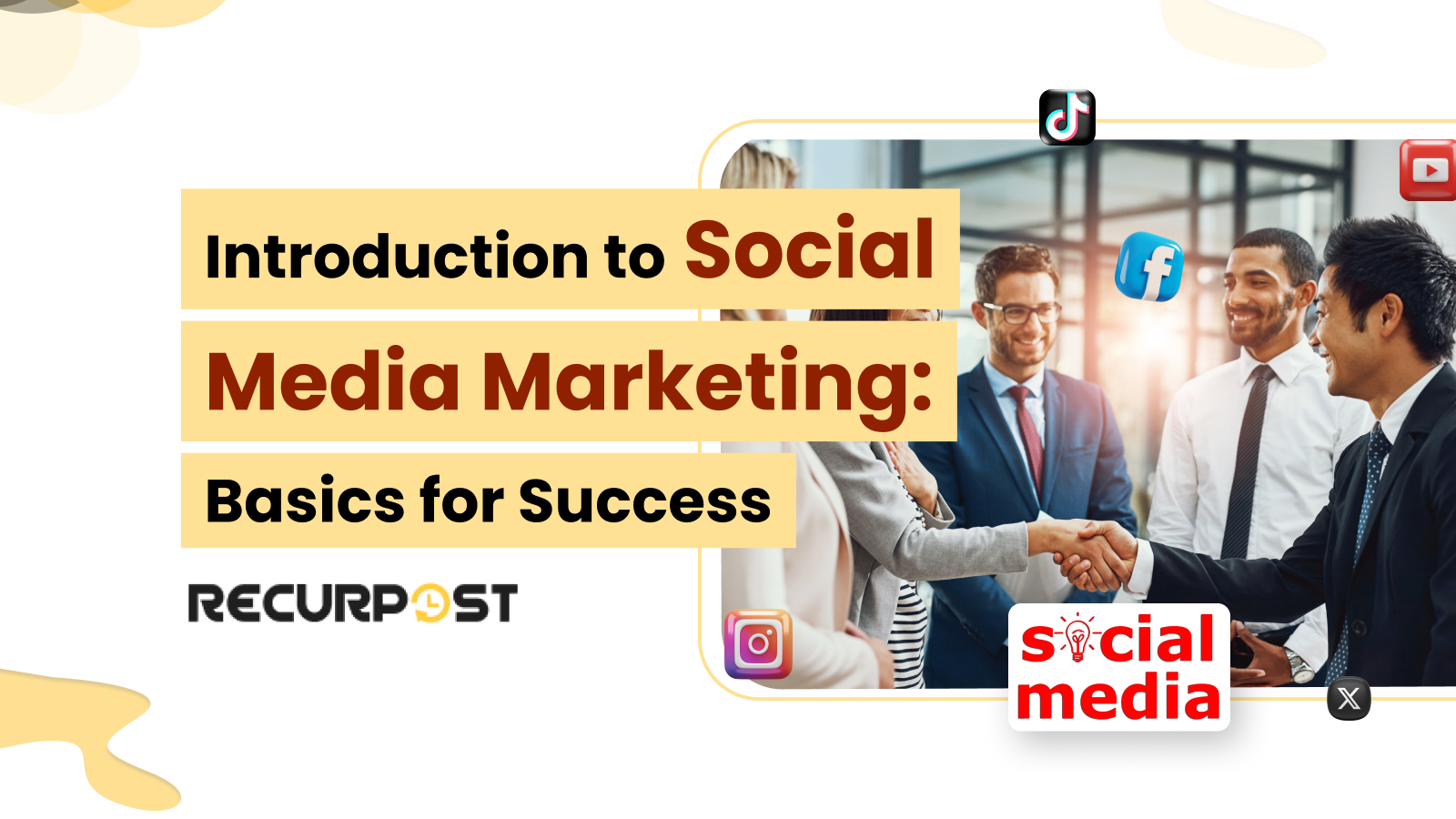Is it too late to start social media marketing in 2025?
Not even close, and here’s why-
Around 5.24 billion people use social platforms, spending an average of 2.5 hours daily scrolling through posts, watching videos, and connecting with brands. If your business isn’t building brand awareness there, competitors already are.
Social media marketing is how companies strengthen trust, spark audience engagement, and drive growth across Instagram, TikTok, LinkedIn, and other platforms. It doesn’t require massive budgets or complex systems, just careful, consistent planning and creative execution.
It differs from social media management, which handles daily posts and replies. Social media marketing defines the direction of your posts and the business outcomes you aim to achieve. It’s not just about posting, but about creating a modern digital ecosystem by selecting the right platforms, creating content for a diverse audience, and analyzing what works.
Social media as a tool for marketing is built for you if:
- You’re launching a new brand and want to gain traction
- You run a small business and need visibility
- You post often but struggle to see measurable returns
In this social media marketing guide, you’ll learn:
- What social media marketing is today
- How it differs from management or traditional advertising
- How is it shaping in 2025 with AI integration
- What are the steps it takes to build a basic plan
- What are the common mistakes it needs to avoid
- What tools help it save time
- Which trends should every brand track
Ready to achieve real business results with social media marketing? Let’s begin it then:
What Is Social Media Marketing (SMM)?
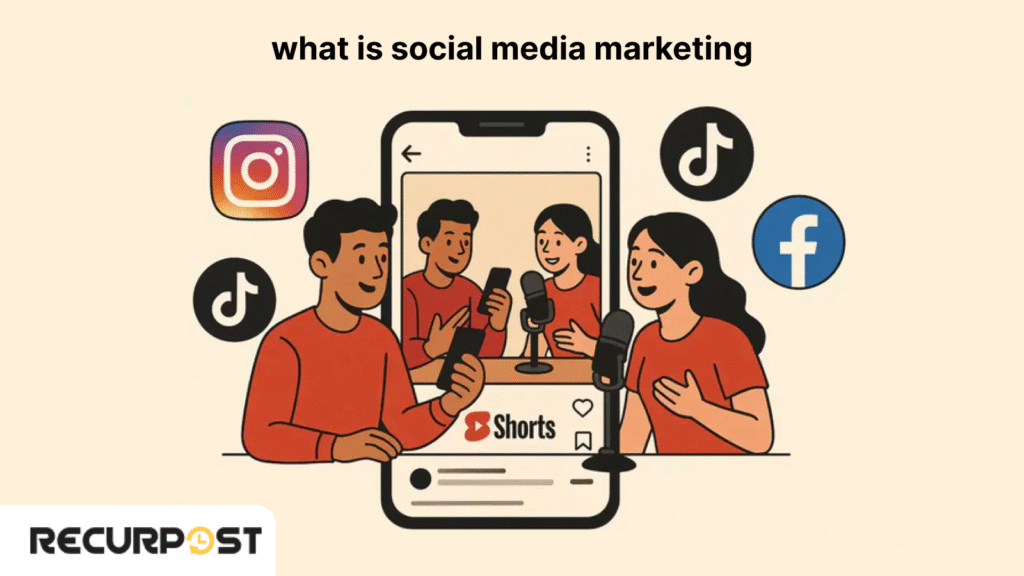
Social media marketing is the structured use of platforms like Instagram, TikTok, LinkedIn, and others to grow brand visibility, support relationship building, and drive measurable business outcomes. It works through posts, carousels, direct messages, and comments that connect people with your brand.
This practice uses varied content formats such as reels, polls, carousels, and behind-the-scenes stories. Each format supports audience engagement by educating, entertaining, or inspiring your followers. The goal is simple: align your content creation with clear objectives instead of chasing every trend or flooding feeds with filler posts.
At its core, social media marketing works on principles that expand awareness, spark interaction, earn trust, and guide potential buyers toward long-term loyalty. These outcomes depend on consistent content distribution and genuine audience interaction, both of which shape successful campaigns and smart publishing decisions.
However, many people often confuse social media marketing with social media management. Here’s a quick breakdown:
Social Media Marketing vs. Social Media Management
Social media marketing defines the purpose behind digital activity. It shapes campaigns, guides messaging, and sets goals like boosting traffic, building brand awareness, or generating conversions. Put simply, it’s the “why” behind your content and platform choices.
Social media management, on the other hand, handles execution. It includes publishing posts, replying to comments and messages, refreshing bios, tracking results, and adjusting in real time. It’s the “how” that keeps the marketing direction in motion.
For example, a social media marketing plan might include a campaign called “Cupcake Fridays”. The marketer creates a series of Instagram Reels designed to build excitement around weekly specials. The manager ensures those Reels go live on time, interacts with customers in the comments, shares user-generated content, and keeps engagement flowing with reposts and responses.
Social media campaign management extends beyond daily posting. It’s a structured process of designing, running, and reviewing focused initiatives tied to defined business outcomes that move through various stages, such as:
- Goal setting and audience research
- Content development with cohesive themes
- Launch and distribution across chosen channels
- Engagement metrics and results tracking against initial targets
Effective campaign workflows rely on content batching. Marketers create multiple posts in dedicated sessions, then schedule them across platforms while monitoring live performance.
New marketers benefit from manageable campaigns such as a 7-day product showcase or a 4-week educational content series. Success depends on campaign templates with consistent messaging, strong calls-to-action in each post, and continuous performance tracking during live campaigns.
Tools like RecurPost simplify this process by supporting advanced scheduling and centralizing engagement insights across the campaign lifecycle.
Traditional Marketing vs. Social Media Advertising
Why is social media marketing overtaking traditional methods in nearly every category? The difference lies in cost, speed, targeting, and measurable outcomes.
| Feature | Traditional Marketing | Social Media Advertising |
|---|---|---|
| Budget | Live insights, comments, and DMs | ₹700+ for a boosted Instagram post |
| Targeting | Broad, generic audiences | Precise filters by age, interests, location, and behavior |
| Speed | Days or weeks to launch | Instant campaigns with real-time updates |
| Feedback | Post-campaign analysis | Live insights, comments, and DMs |
| Content | Static formats: flyers, print ads, billboards | Dynamic formats: videos, reels, stories, polls, carousels |
| Engagement | One-way communication | Two-way interactions for building a strong social media presence |
| Tracking | Rough estimates | Exact data: reach and impressions, roi measurement, click-through rate, saves, and shares |
Important Insights to Keep in Mind:
- 63.9% of the world’s population is active on social media as of 2025. (Smart insight)
- Global paid advertising spend on social channels has grown by 14.5% this year, crossing $270 billion (Statista).
- 83% of marketers say social media marketing delivers more qualified leads than traditional methods (Sprinklr).
- Brands without an active social media presence miss out on 45% of first-time inquiries (Meta, 2025).
The data is clear: social media marketing isn’t just more affordable, it’s faster, more interactive, and backed by proper analytics towards its target audience.
Why You Need a Tailored Social Media Marketing Strategy in 2025
In today’s landscape, a single formula no longer delivers results. Every platform behaves differently, every target audience responds to different formats, and every brand has unique goals. In 2025, tailored social media marketing plans are mandatory for lasting growth.
Personalization matters in SMM because:
- Algorithm shifts: Instagram’s algorithm now prioritizes content based on user behavior and niche interests. Content aimed at a specific audience performs better than generic content designed for everyone.
- Audience expectations: Users stay loyal to accounts that reflect their values. A skincare label engaging Gen Z needs a tone, format, and posting schedule very different from one addressing professionals in their 40s.
- Content overload: More than 95 million posts appear on Instagram daily. Tailored social media marketing plans help brands cut through noise by delivering what their audience wants; at the right time, in the right form.
- ROI depends on specificity: Brands using custom strategies that include niche influencer partnerships, platform-specific features, and audience insights see up to 3x better conversion rates than those using templated campaigns.
- Social commerce growth: Instagram Shops, affiliate links, and shoppable stories all require different strategies to turn views into sales. Without direction, brands risk losing measurable returns.
A refined social media marketing plan relies on data-driven decisions. That means learning which creators audiences trust, identifying active time slots, and shaping personalized messaging that leads to measurable action.
A well tailored strategy thus aligns tools like content calendars, smart goals, and platform selection with your audience behavior.
Core Components Of Social Media Marketing Services
Content Strategy & Creation: Professional providers craft design content calendars, write captions, build custom graphics with design applications, and produce videos that match brand voice while advancing business goals. This includes both routine posts and specialized campaign materials.
Platform Management: Teams oversee scheduling tools, manage daily publishing, handle community engagement, and respond to direct messages. These tasks keep your social media marketing consistent while freeing businesses to focus on higher priorities.
Paid Advertising Management: Most services incorporate paid social advertising campaigns, audience targeting, budget allocation, and performance optimization. Coverage extends from simple post promotions to sophisticated marketing funnels engineered to capture leads or drive conversions.
Analytics & reporting: Professional providers use analytics dashboards and performance tracking tools to monitor engagement rates, click-through rates, and conversion tracking. They showcase effective tactics while revealing areas that need improvement.
Strategy Development: Services often begin with a detailed audit of your existing social media presence, thorough target audience research, and competitor analysis. Based on this, they create plans powered by learning resources such as AI assistants, automation tools, and structured workflows that support your specific business goals.
Social media marketing services cover multiple components and learning resources that work together to deliver measurable growth.
What to Expect from Professional Social Media Marketing Services
Reputable social media marketing services deliver measurable results such as higher engagement rates, steady audience growth, increased website traffic, and improved lead generation. The standard services offered include monthly reports, roi measurement, and consultations in real time.
Social media management platforms’ packages differ in scope. Some focus on content creation, scheduling tools, and engagement practices. Others provide fully managed campaign design, paid ads, advanced reporting, and traffic sources analysis.
Whether you’re building your first social media marketing presence or expanding an established channel, selecting the right service ensures growth aligned with both immediate needs and long-term goals.
Why Social Media Strategy Is Essential Right Now
In digital space:
- Attention spans are short, and people decide in seconds whether to stop scrolling
- Social platforms shift fast, and platform-specific features change how audiences engage.
- Traditional ads cost more and move more slowly than digital alternatives.
- Audiences prefer authentic storytelling over polished, sales-driven intent.
Best practices for social media marketing include:
- Matching platform selection to audience goals
- Staying consistent across formats and channels
- Designing content that sparks interaction
- Using scheduling and publishing tools to balance visibility with efficiency
- Tracking outcomes with metrics such as reach, conversions, and engagement
Strategy Beats Spontaneity In Social Media Marketing
Sure, spontaneous posts can go viral time and again, but they can’t sustain growth. A social media marketing strategy helps you:
- Define clear goals such as brand awareness, lead generation, or stronger engagement
- Select the right mix of social media platforms for your audience
- Shape content to match audience needs rather than chasing trends
- Use automation tools and social listening to stay visible without burning out
When social media marketing is aligned with structured planning, businesses stop guessing and start building reliable growth.
7-Step Blueprint to Build Your Social Media Marketing Strategy (From Scratch)
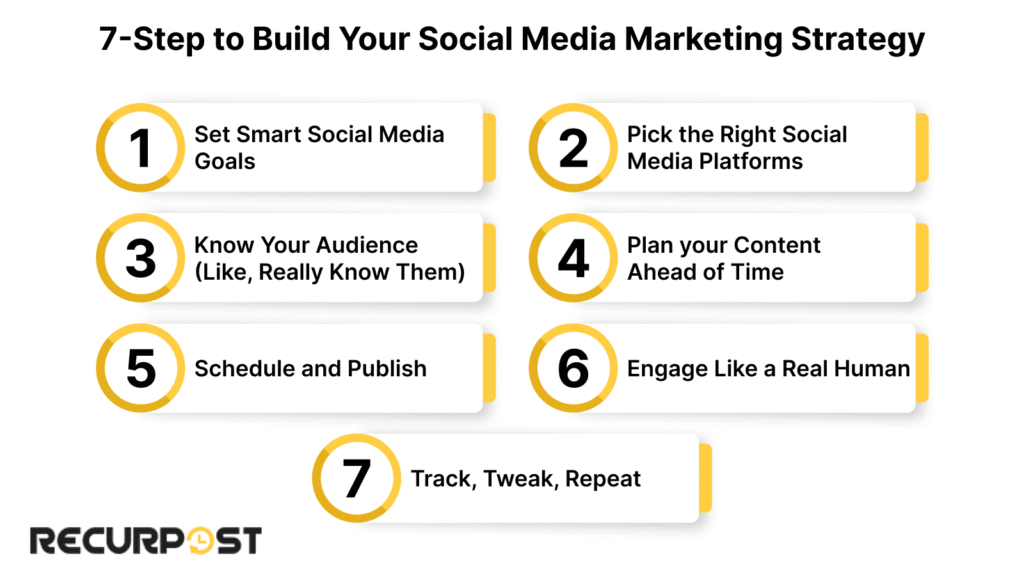
Building a successful social media strategy requires a repeatable plan you can tweak, track, and trust. Here are the key steps to turn this framework into a working strategy.
Step 1: Set Smart Social Media Marketing Goals
By setting clear targets, you avoid wasted effort and define success with measurable outcomes like:
- Gain 1,000 Instagram followers in 3 months
- Book 10 client calls through LinkedIn thought leadership posts
- Capture 50 email signups with Facebook groups or paid campaigns
Use SMART goals:
Here, SMART means: Specific, Measurable, Achievable, Relevant, and Time-bound.
These goals are the base of your entire social media marketing plan.
Step 2: Pick the Right Social Media Platforms
Choose social media platforms that match your audience and product.
Consider:
- Audience behavior shifts
- Platform strengths
- Where your content style fits best
| If your audience is… | Try these platforms |
| Gen Z, creators | TikTok, Instagram |
| Working professionals | LinkedIn, YouTube |
| Local shoppers | Facebook, Instagram |
| Visual-first buyers | Instagram, Pinterest |
Pick max two social media platforms to start, and later you can expand.
Step 3: Know Your Audience (Like, Really Know Them)
Content succeeds when it speaks to real people.
Use tools like:
- Meta Audience Insights for Facebook and Instagram
- LinkedIn Analytics to see who’s engaging
- Google Analytics for behavior and traffic sources
- RecurPost for performance and community management tracking
Collect insights on:
- Audience demographics: age, gender, location
- Active time slots and posting habits
- Posts that spark shares, comments, or testimonials
- Content formats that improve retention rate
These insights reveal your audience behavior, which, when paired with social listening, helps monitor brand sentiment, while analytics tools confirm whether your audience research is driving growth.
Read: To Learn [How to attract a suitable audience]
Step 4: Plan Your Content Ahead of Time
Planning prevents the daily stress of “What should I post today?” Build a simple social media content calendar that includes:
- Weekly themes (education content, social proof, product showcases)
- Post types (carousels, videos, polls and quizzes, interactive stories)
- Captions and hashtags
- Posting schedule for each platform
Batch content creation weekly or monthly with Canva(for visuals) and Notion or Google Docs(for planning).
Bonus: RecurPost helps content recycling, so your best and evergreen posts continue to work for you.
Step 5: Schedule and Publish
Automating posting with a Recurpost social media management platform enables:
- Scheduling and publishing across multiple social media accounts
- Finding the best times to post
- Maintaining a unified brand voice
- Repurposing content, recycling, and cross-platform promotion
Automation tools save time while maintaining rhythm across platforms.
Step 6: Engage Like a Real Human
Engage directly with your audience after posting content.
- Reply to every comment
- React to DMs
- Share user-generated content (with credit)
- Use polls and quizzes to spark conversation
These small actions strengthen community management and loyalty. Engagement isn’t just about what you post; it’s how you respond.
Step 7: Track, Tweak, & Repeat The Process
Social media marketing succeeds when performance is tracked consistently and actions are adjusted with data. Track progress using these key metrics:
- Engagement rate (likes, comments, shares)
- Reach and impressions
- Website traffic from social media
- Conversion tracking (leads or signups)
Analytics show which posts perform best, when audiences are most active, and how engagement trends shift over time. It eliminates the guesswork by showing you exactly what your audience loves and when they’re scrolling. Key metrics to monitor include engagement rates, reach, impressions, and click-through rates.
Make it a habit to review these social media metrics weekly to identify trends. When you notice that video posts generate twice the comments of photo posts, that’s your cue to prioritize video content. For this, every central platform provides native analytics tools.
Instagram Insights breaks down your best-performing content and audience characteristics, while Facebook Analytics pinpoints when your followers are most active online. RecurPost streamlines this process by bringing all your platform data into one dashboard, simplifying performance comparisons and content planning decisions.
Combine this data with a/b testing to refine future campaigns. Monitoring retention rate and brand sentiment confirms whether growth is sustainable and relationships are strengthening.
Organic and Paid Social Media Marketing = The Smart Mix
Organic social media marketing builds trust while paid social advertising accelerates growth. Combining strong organic content with small, targeted boosts stretches reach without stretching budgets.
Start with Organic Marketing to Find What Works
Test ideas through organic marketing posts that educate, entertain, or connect without selling.
Organic posting gives you:
- Real-time feedback on content style and format
- Data on when your target audience is most active
- Confidence in what to boost or turn into ads
Use your social media content calendar to keep track of likes, shares, DMs, and saves. This data guides your marketing strategies and saves time later.
Boost Top Posts with Paid Ads
Scale effectively by turning high-performing organic posts into paid social advertising.
What to boost:
- Reels or Stories with strong engagement metrics
- Posts with high saves or shares
- Testimonials or reviews with strong comments
Platforms like Instagram and Facebook make it easy to boost posts right from your feed. Set your marketing goals clearly, such as increasing website visits, email signups, or product views.
Start small, $5 to $10 per post can get you thousands of views when targeted right.
Pick the Right Goals for Each Campaign
Match each ad to specific social media marketing goals, like: Paid ads work best when they amplify organic reach instead of replacing it.
- Drive traffic to your landing page
- Promote a new digital product
- Grow followers within a niche, with a community-building focus
- Get leads from a giveaway or contest
Tie your goals to real actions, so your paid social media marketing campaigns don’t just cost money; they earn it back.
Use UGC and Micro-Influencers to Build Trust
User-generated content (UGC) builds trust faster than polished brand posts because it feels authentic and relatable. Pair it with micro-influencer collaboration to expand reach and credibility.
Micro-influencers with under 20,000 followers often deliver better engagement and work well for:
- Unboxing or testimonial Reels
- Story shoutouts
- “Day in the life” content featuring your product
Example: A local fitness coach runs a UGC-driven campaign where clients share workout wins. The coach turns them into Story highlights, which perform better than stock photos.
Don’t Skip Organic. Use Paid to Amplify
Paid ads boost your organic reach rather than replace it. Keep posting content that supports your social strategy, such as:
- Value-driven tips
- Behind-the-scenes updates
- Memes that spark user participation
- Product information
Then use ads to expand reach and meet specific marketing goals. Let’s break down the most significant shifts in 2025 and how you can adjust your strategy to keep your social media presence strong.
Social Media Platform Highlights & Starter Moves for 2025
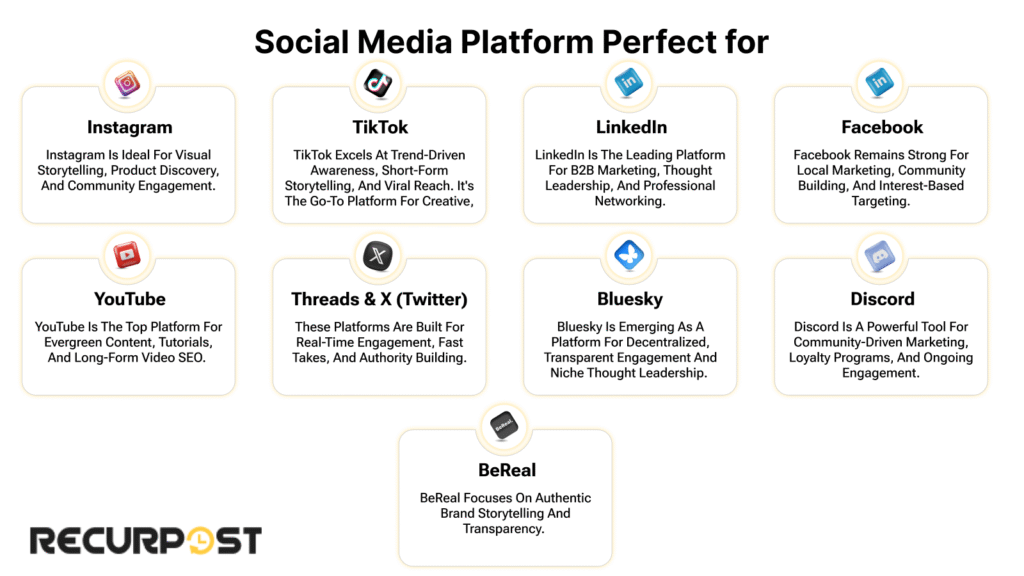
Marketing your business on social media platforms requires applying your social media marketing strategy on platforms where your audience engages. Each platform has unique audiences, content formats, and engagement metrics, making copy-paste posting ineffective.
How to approach each major and emerging platform in 2025:
Instagram: Reels, Product Tags, and Community
Instagram is a leading platform for engagement and e-commerce in 2025.
Key Highlights Right Now:
- Reels with sharp hooks and captions under 15 seconds (optimal video length = more engagement)
- Product tags, product showcases, and shoppable posts
- Interactive Stories (polls, quizzes, Q&As) to increase community involvement
- UGC and behind-the-scenes clips that build trust
Starter move: Create a weekly Reels series with value-driven or product-focused content. Use Instagram Insights to find the best times to post.
TikTok: Raw Creativity Meets AI Trends
TikTok short-form videos drive trends and discovery through short-form video dominance that blends creativity with rapid engagement.
Key Highlights Right Now:
- Short-form AI-generated or enhanced videos (7–15 seconds)
- Trending sounds with a personal twist
- Micro-educational tips and day-in-the-life content
- Relatable posts built on authentic storytelling
Starter move: Post three videos a week. Experiment with different styles: funny, educational, or user-driven, and see what connects best with your target audience.
LinkedIn: Thought Leadership Meets Real Talk
LinkedIn functions as a content and networking hub for professionals and creators.
Key Highlights Right Now:
- Behind-the-scenes updates or personal growth stories
- Native carousels, documents, and short-form posts
- Story-driven posts shaped around LinkedIn thought leadership and expertise
- Consistent hashtag strategy: 3–5 relevant tags per post
Starter move: Share a weekly reflection, case study, or thought leadership post. Pair it with active engagement practices to grow visibility.
Facebook: Niche Communities and Local Power
Facebook remains strong for local marketing, events, and interest-based communities.
Key Highlights Right Now:
- Local business promotions with Events and targeted Ads
- Running or joining niche Facebook Groups
- UGC and real reviews
- Facebook Live Q&As or product drops
Starter move: Launch a Facebook Group around your business niche. Post authentic storytelling value-driven content and regularly prompt discussions.
YouTube: Authority and Evergreen Search
YouTube excels in long-form, searchable content and is now rapidly growing in short-form videos as well.
Key Highlights Right Now:
- YouTube Shorts are algorithm darlings
- Its tutorials, reviews, and expert explainers
- Keyword-optimized titles, tags, and descriptions
- Playlists organized for binge-friendly viewing
Starter move: Repurpose your TikToks or Reels into YouTube Shorts. Optimize titles like “How to Bake Sourdough in 2025” for search engine optimization.
Threads & X (Twitter): Fast Takes and Authority Building
Perfect for brands and creators who thrive on conversation and commentary.
Key Highlights Right Now:
- Quick how-tos, commentary on trends
- Consistent daily posts (1–2 per day)
- Mini-threads or insights in plain text
- Community engagement through replies and retweets
Starter move: Open with short, insightful one-liners such as a “Tip of the Day”. Engage meaningfully with responses.
Bluesky: Rising Star in Decentralized Social
Bluesky decentralized social grew from 13 million users in late 2024 to 26 million in early 2025, attracting creators, developers, and open internet advocates.
Key Highlights Right Now:
- Clean, conversation-first posts
- Community-driven discussions
- Ideal for niche brands or early adopters
- Space built on credibility, transparency, and authenticity
Starter move: Share behind-the-scenes reflections and industry insights with less focus on quick wins and more on community building and lasting trust.
Discord: Community-Led Brand Ecosystem
Discord has moved far beyond gaming, evolving into a hub for Discord community building and brand engagement.
Key Highlights Right Now:
- Invite-only groups for loyal customers
- Channels dedicated to support, tips, or feedback
- Exclusive drops, polls, and voice chats
- Ideal for education brands, creators, and tech startups
Starter move: Launch a small, invite-only Discord server around your niche for active community management. Create channels for learning, updates, and casual chat.
BeReal: Authenticity-First Storytelling
BeReal is built around raw, unfiltered moments, which aligns with the growing audience demand for authenticity.
Key Highlights Right Now:
- In-the-moment photos from teams and users
- Human-centered storytelling with BeReal authenticity
- Great for brands prioritizing transparency and personality
Starter move: Document real-time product use, team culture, or customer experiences with real authenticity. Think of it as a “brand diary.”
Using platforms the right way in 2025 means embracing their strengths and their audiences. The goal isn’t to be on all of them, but to concentrate on 1–2 platforms that align with your goals.
Trends to Watch for Social Media Marketing in 2025
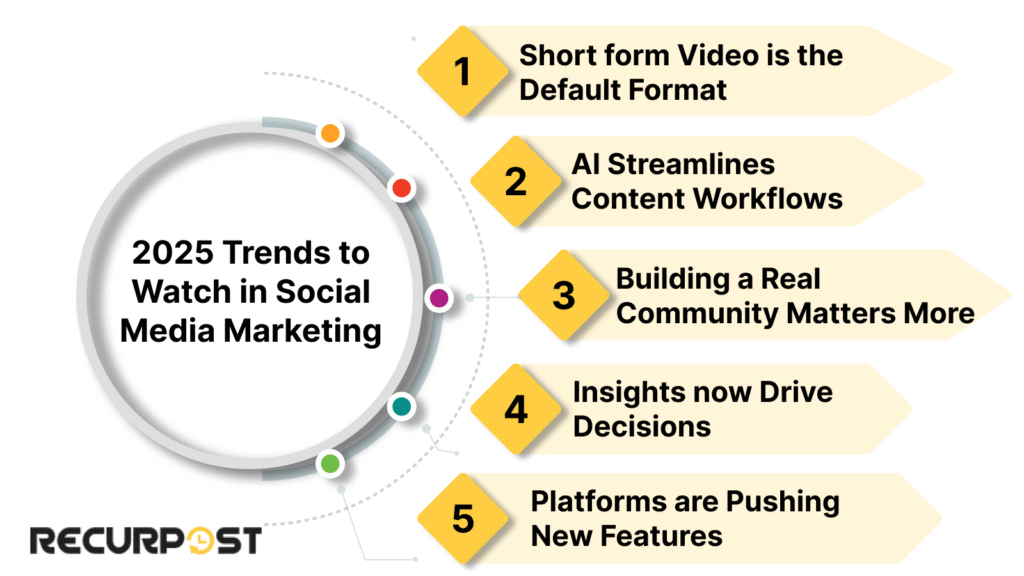
Trends shape every move in social media and help you stay ahead. In 2025, if you want your strategy to work flawlessly, watch out for these trends.
Short Form Video Is the Default Format
Reels, TikToks, and YouTube Shorts drive more engagement than static content across social platforms.
What this means:
- Videos under 30 seconds perform best
- Strong hooks in the first 3 seconds are essential
- Adding captions helps; many users scroll with sound off
Short videos help increase brand awareness and create engaging content that stands out in fast-moving feeds.
AI Streamlines Content Workflows
AI integrates into social media marketing through tools and platform features.
Marketers use AI tools like RecurPost, Canva AI, and ChatGPT to:
- Plan posts in bulk using a content calendar
- Write captions that match your brand voice
- Repurpose old posts that performed well
- Save time on replies and scheduling with automation tools
AI supports your marketing strategies, but you still need to guide it with a clear voice and goals.
Insights Drive Smarter Decisions
Rapid audience shifts make analytics tracking and performance tracking necessary for effectiveness.
Track:
- What time is your target audience most active
- Which content formats generate the most audience engagement
- How people move from posts to clicks or messages
Use tools like RecurPost analytics, native platform insights, and Google Analytics to measure success and gather valuable insights.
These insights shape everything from post timing to campaign budgets.
The Power of Real Community Building
Brands with a strong social media presence outperform those chasing followers.
Focus on:
- Consistent replies in comments and DMs
- Stories with polls and quizzes
- Sharing user-generated content (UGC) with credit
This approach improves customer engagement and keeps people returning to your page. It also helps with social media listening, so you understand what your audience says and wants from your brand.
Platforms Are Pushing New Features
Each network updates its algorithm and tools often. Using new features early gives you better reach.
What’s new in 2025:
- Instagram: Reels with product tags, exclusive stories for close followers
- TikTok: Search-driven shopping and creator monetization tools
- LinkedIn: AI-based summaries and resume boosters tied to LinkedIn thought leadership
- Threads: Polls and visual replies
- Facebook: Groups and Marketplace integration for local targeting
Staying updated helps with competitive analysis. If your rivals use new tools along with smart platform selection and you don’t, they’ll get more visibility. Use these trends to sharpen your social media content strategy, reach more people, and connect in ways that feel current.
Best Tools & Resources for Social Media Marketing in 2025
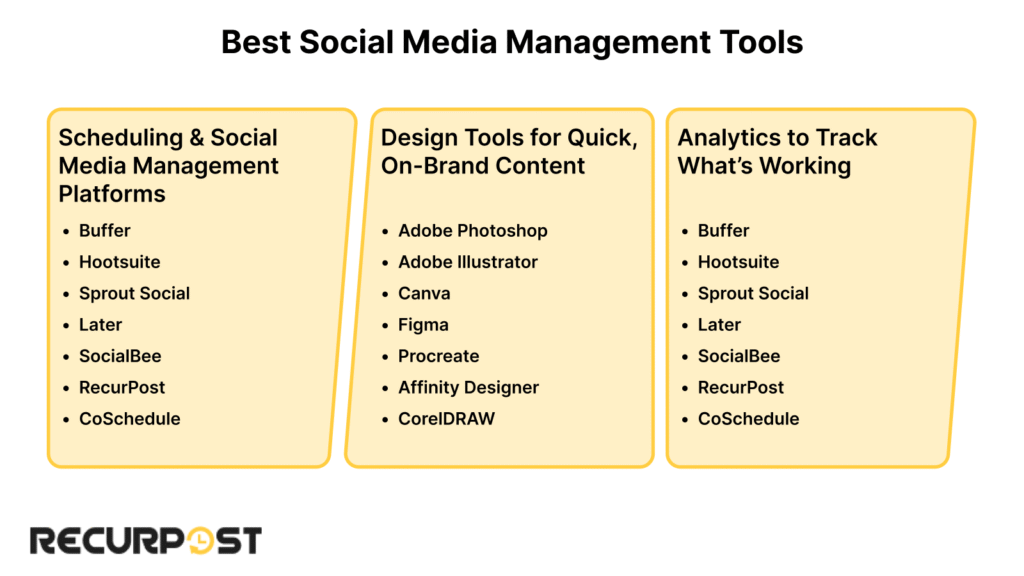
Tools should support your social media marketing from planning to publishing. The right stack supports growth, helps achieve business outcomes, and keeps content aligned with your smart goals.
Scheduling & Social Media Management Platforms
Social media management platforms and scheduling tools ensure consistent visibility and measurable results. They help brands stick to a posting schedule, track engagement, and sustain a unified brand voice.
Top tools:
- RecurPost: Ideal for solo creators and small teams. Helps you build a reliable social media content calendar, recycle evergreen posts, and maintain a consistent voice across all platforms.
- Buffer: A Simple scheduling tool for multiple social networks in one place.
- Hootsuite: Great if you’re handling several accounts and need team collaboration features.
Use these to support your smart social media goals, like posting three times a week or increasing reach by 20% in a month.
Design Tools for Quick, On-Brand Content
Strong visuals help your posts stand out in crowded feeds. Design applications allow you to create branded graphics fast.
Top picks:
- Canva: With its vast library of templates for Stories, Reels, and carousels, it’s ideal for anyone without a design background.
- Adobe Express: Helps with both static and video formats. Ideal for making ad creatives quickly.
Use these tools to keep your brand voice clear and your posts visually aligned with your marketing goals.
Analytics to Track What’s Working
With analytics tracking and performance tracking, guesswork disappears. This data guides on what to keep and what to cut.
Track metrics like:
- Post reach and impressions
- Click-through rates
- Saves, shares, and comments
- Website traffic from traffic sources
Tools to use:
- RecurPost Analytics dashboards for performance across platforms
- Native insights (e.g., Instagram Insights, LinkedIn Analytics)
- Google Analytics for deeper conversion tracking and ROI measurement
These tools help you measure success and make smarter decisions about your digital marketing.
Learning Resources to Begin With
Social media changes fast. Ongoing learning helps you stay confident and aligned with current social media marketing trends.
Useful resources:
- RecurPost Blog: Offers practical tips, examples, and templates for beginners.
- Meta Blueprint: Official tutorials for Facebook and Instagram.
- Google Digital Garage: Great for foundational educational content on online marketing and SEO.
These learning resources are especially valuable for beginners who need clear, structured guidance to get started. The right tools give structure to your marketing strategies, reduce overwhelm, and help you create better content in less time. They make daily posting easier and help turn followers into tangible results.
Common Social Media Marketing Mistakes to Avoid in 2025
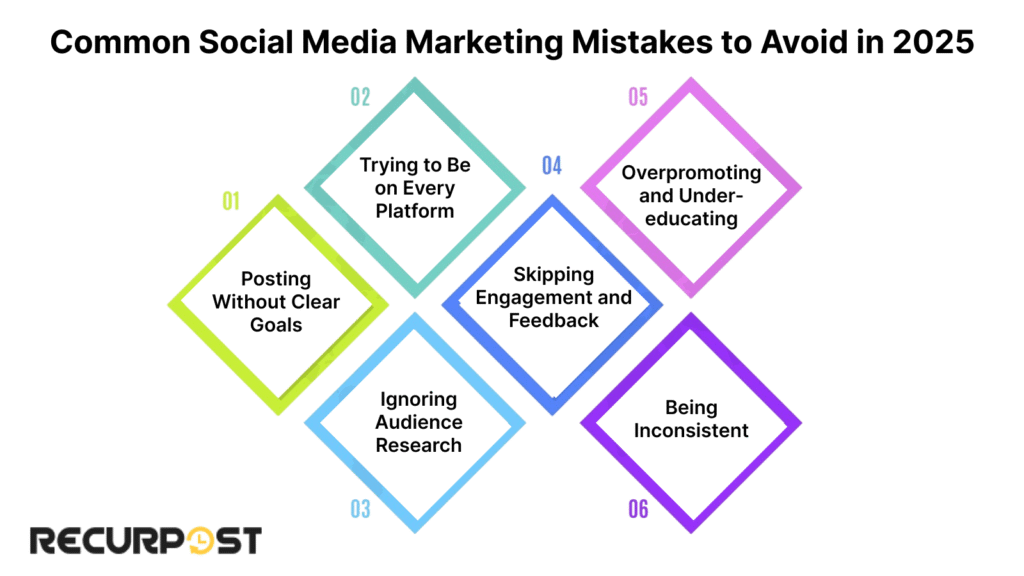
To establish a genuine social media presence, avoid these common mistakes that hinder progress or confuse your target audience.
Posting Without Clear Goals
Just sharing random social media posts won’t grow your business. Every post should support your marketing goals, whether it’s increasing audience engagement, driving traffic, or generating leads.
Before you hit publish, ask:
“What’s the purpose of this post?”
Tie every piece of content back to your social media marketing strategy.
Trying to Be on Every Platform
Not all social media networks are right for your business. Each platform has a different style, pace, and user base. Instead of spreading yourself thin across various platforms, use platform selection and audience research to pick 1–2 platforms where your audience is already active.
Example: A coach helping Gen Z entrepreneurs should prioritize TikTok and Instagram, not Facebook and Twitter.
Ignoring Audience Research
Guessing what your audience wants is risky. Use data to shape your marketing strategies.
Conduct regular audience research to learn:
- What topics do they care about
- When they’re online
- Which formats do they prefer (video, carousel, polls)
- Where do they engage the most
Enhance your audience engagement and connect better with them.
Skipping Engagement and Feedback
Posting without interaction misses the heart of relationship building. Engagement practices build trust, loyalty, credibility and meaningful connections.
When people comment or message you, respond. Ask questions in your captions. Use polls and quizzes to gather feedback. Social media is a conversation, not a broadcast.
Ignoring feedback risks losing your audience growth potential.
Overpromoting and Under-Educating
Apply the 80/20 rule to avoid excessive promotion
80% value (tips, stories, Q&A), 20% promotion.
Position yourself as a source of thought leadership. Share tips, explain your process, or show client results. People don’t follow brands to be sold to. They follow brands that help them.
Being Inconsistent
Inconsistent posting causes algorithms and audiences to forget your brand.
Create a posting plan with a social media content calendar. Even if you post just twice a week, showing up consistently builds familiarity and authority.
Avoiding these mistakes helps you build stronger connections, expand organic reach, and create content that drives measurable business outcomes.
Conclusion: Social Media Marketing Is Your Most Powerful Tool in 2025
Social media marketing isn’t just an option anymore; it’s the foundation for audience engagement, brand awareness building, and measurable business outcomes. Success comes from setting clear goals, using a content calendar, maintaining consistent posting, and tracking engagement metrics through reliable performance tracking tools.
Most importantly, social media helps you connect with real people who care about your brand. Social media marketing can help drive growth, strengthen relationships, and enhance audience growth and community building. Simplify your strategy with RecurPost, which offers tools to schedule, repurpose, and manage content, all in one place.
FAQ: Social Media Marketing for Beginners in 2025
1. Do I need to be on every platform to grow?
No. Start with 1–2 platforms where your target audience spends time. Each social platform offers different strengths, but you don’t need all of them. Focus on where you can be consistent and create content that fits.
2. What kind of content should I post first?
Begin with simple formats:
-Educational tips related to your niche
-Behind the scenes of your work
-Polls and quizzes or Q&As to gather feedback
These help build trust and spark meaningful connections.
3. How often should I post as a beginner?
2–3 times a week is a solid start, as what matters most is consistency. A regular posting schedule builds a strong social media presence over time.
4. What tools should I use for organizing content?
Use tools like:
–RecurPost for scheduling and content recycling
-Canva for design
-Google Docs or Notion for planning your calendar
Platform analytics + RecurPost to track what’s working
5. Is short-form video really necessary for me?
Yes. Short-form video dominates 2025. Instagram Reels, TikTok short-form videos, and YouTube Shorts deliver higher organic reach than static posts.
6. How should I know what my audience wants?
Use social media listening and basic analytics. Watch for:
-Which posts get saves, comments, or shares
-What questions do people ask in comments or DMs
-Feedback from polls and quizzes, and reactions
This is key to adjusting your marketing strategies and posting content your audience wants.
7. How do I grow without ads?
You grow by:
-Posting consistently
-Sharing educational content
-Responding to DMs and comments
-Using Stories, Reels, and community tools
-Listening, adjusting, and staying present
Building a brand organically takes time, but it leads to deeper trust and more loyal followers.

Fenil Patel makes complex topics simple and useful for readers who want clarity, value, and actionable takeaways. As an SEO content writer with 4+ years of experience, he creates blogs and website content that answer real questions, solve problems, and guide readers toward informed decisions. Whether it’s healthcare, fashion, or SaaS, Fenil’s writing is designed to give you practical insights while ensuring the information you read is trustworthy, engaging, and easy to apply.

